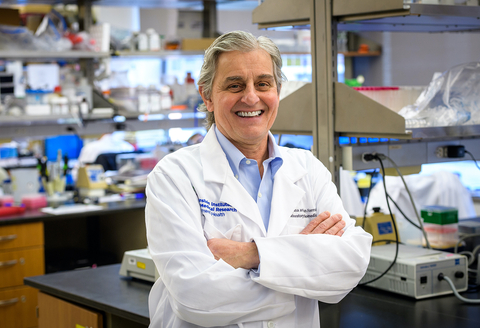MANHASSET, N.Y.– The Hans Wigzell Research Foundation today announced that Kevin J. Tracey, MD, president and CEO of Northwell Health’s Feinstein Institutes for Medical Research, is the recipient of the 2023 Hans Wigzell Research Foundation’s Science Prize in recognition of his significant contributions to the fields of neuroscience and neuroimmunology. Dr. Tracey will travel to Stockholm, Sweden, to receive the prize, which includes $100,000, and deliver a lecture on December 1.
One of Dr. Tracey’s most notable achievements is his discovery of the body’s “inflammatory reflex,” which is a neural circuit that regulates the body’s inflammatory response. This seminal finding led to the field of bioelectronic medicine. This relatively new and innovative approach combines principles of neuroscience, immunology and electrical engineering to develop novel therapies and medical devices to modulate this reflex to treat conditions such as rheumatoid arthritis, inflammatory bowel disease and even potentially life-threatening infections.
“The prize is given to Dr. Tracey for his innovative discoveries of the mechanisms of how nerves transmit signals to stop inflammatory diseases,” said Hans Wigzell, MD, PhD, on behalf of the Hans Wigzell Research Foundation. “Dr. Tracey’s research is a surprising new inroad to treat inflammation using computer chips targeting nerves instead of drugs.”
Dr. Hans Wigzell is a former president of the Karolinska Institute and former chairman of the Nobel Prize Committee of the Institute. He also is a member of the Royal Academy of Sciences, the Royal Academy of Engineering Sciences and Finnish Science Society. The Foundation promotes its support of scientific research and education in the medical field, particularly through scholarships and other grants. It will also organize and support seminars and conferences.
“I am honored and sincerely grateful to Professor Wigzell and the Foundation,” said Dr. Tracey, executive vice president of research and Karches Family Distinguished Chair in Medical Research at Northwell Health, New York’s largest health system. “This prize celebrates the work of outstanding teams of brilliant colleagues who dedicated years of research in the shared hope of making discoveries that improve the lives of patients needing better therapies for inflammation. Having met some of the first patients who benefited from this work, we now in turn, dedicate this prize to them.”
Dr. Tracey is among one of the most cited scientists in the world. For four decades, his research, which has been published with more than 1,000 co-authors, collaborators, post-docs, and students, has provided novel, basic discoveries about biological mechanisms underlying inflammation that have been translated into clinical development and practice. This work includes targeting cytokines using biological agents and developing vagus nerve stimulators to harness evolutionarily conserved reflex circuits to suppress inflammation in animal models and in humans with rheumatoid arthritis and inflammatory bowel disease.
“This new concept of neuroimmunology to treat inflammation using vagus nerve stimulation has revolutionized how we think about therapy for autoimmune diseases and other conditions,” Dr. Wigzell said. “His research has positioned medical devices treating inflammation to potentially disrupt the standard medical treatment of inflammation with expensive biologics.”
Dr. Tracey and collaborators, including Sangeeta Chavan, PhD, professor in the Institute of Bioelectronic Medicine at the Feinstein Institutes, have also uncovered substantial evidence that damage to the vagus nerve and the inflammatory reflex may underlie the progression and severity of inflammation, an insight that has launched new companies and clinical trials using devices to stimulate nerves to suppress inflammation. Several successful clinical trials have already been published, and the United States Food and Drug Administration has awarded a breakthrough designation to the ongoing clinical trials in rheumatoid arthritis, which are nearing completion.
“Kevin Tracey created a new category of medicine and gives our patients hope for future cures,” said Michael Dowling, president and CEO of Northwell Health. “The 85,000 employees of Northwell Health are proud of Dr. Tracey’s accomplishments and join the scientific community in celebrating this honor.”
Dr. Tracey decided to dedicate his career to medicine at the age of 5 after his mother passed away from an inoperable brain tumor. This profound event sparked his desire to go into medicine, particularly neurosurgery. He pursued his medical education and eventually became a neurosurgery resident at New York Hospital-Cornell University Medical Center.
In 1985, he found himself tending to an 11-month-old girl named Janice whose grandmother accidentally spilled boiling water on her granddaughter. The situation appeared dire, and the medical team had little hope for her survival. Miraculously, Janice defied the odds and survived for a month, tragically slipping into unexplained shock and passing away in Dr. Tracey’s arms. This devastating loss haunted him deeply, as Janice’s life was claimed by septic shock. From that moment forward, Dr. Tracey sought to understand better what caused her death and how to prevent that from ever happening again.
Dr. Tracey received his BS in chemistry, summa cum laude, Phi Beta Kappa, from Boston College in 1979, and his MD from Boston University in 1983. He trained in neurosurgery from 1983 to 1992 at the New York Hospital-Cornell University Medical Center and was a guest investigator at the Rockefeller University before moving in 1992 to the Feinstein Institutes. He directs the Laboratory of Biomedical Science and was appointed president and CEO there in 2005.
An inventor of more than 120 United States patents and author of more than 400 scientific publications, Dr. Tracey co-founded the Global Sepsis Alliance, a non-profit organization supporting the efforts of more than 1 million sepsis caregivers in over 70 countries. Dr. Tracey is the author of Fatal Sequence (Dana Press) and delivers lectures nationally and internationally on inflammation, sepsis, the neuroscience of immunity, and bioelectronic medicine.


